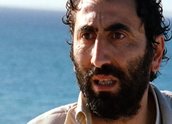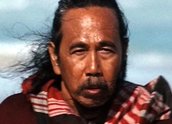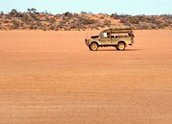


Lucky Miles (2007)
Synopsis
An Indonesian fishing boat dumps six Cambodians and six Iraqis on the remote coast of northwest Australia, in 1990. Muluk (Sawung Jabo), the captain, tells them to climb a dune to a bus stop, then sails away, knowing there is no bus stop. Most of them are soon picked up by police, but two escape. Arun (Kenneth Moraleda) wants to walk to Perth, to find the Australian man who fathered him in Cambodia in 1972. Youssif, an Iraqi engineer (Rodney Afif), wants to seek political asylum. They are 2,000 kilometres north of Perth, without a map and with little water. After walking for a day, they find Ramelan (Srisacd Sacdpraseuth), one of the fishermen who brought them to Australia. He caused the fishing boat to sink and his relatives have abandoned him. Muluk and Abdu (Arif Hidayat) are walking north to Broome, as an Australian Army reserve patrol tries to find the other three missing men. Private Tom Collins (Sean Mununggurr) is an expert Aboriginal tracker; Sergeant O’Shane (Glenn Shea) and Private Plank (Don Hany) are not. Plank manages only to run their Land Rover into a waterhole. After many setbacks, the reservists, the refugees and the fishermen run into each other.
Curator’s notes
Lucky Miles is an unusual treatment of an uncommon subject. Few Australian films have dealt with the migrant experience, even fewer with illegal immigration and refugees. Almost none has attempted to look at the subject through comedy, but the film manages to do that without losing its sense of compassion. The script is based on the true stories of several refugees who survived the ordeal of being abandoned on the Australian coastline, but the writers have grafted these onto a more universal sense of comedy. The film is partly about reversal of fortune – with its characters grouped in threes. Once they meet up in the desert, the Iraqi, the Cambodian and the Indonesian are constantly at each other’s throats. Ramelan was one of the fishermen who abandoned them, so when he turns up almost dead in the desert, Youssif takes one of his rubber flip-flops to replace his lost shoe. Youssif and Arun push him along like a donkey as Ramelan pretends to guide them towards the coast. He is a hopeless navigator, but he stumbles on the only waterhole for hundreds of kilometres, and temporarily becomes popular. The rankings and alliances are constantly shifting between them, which gives the film a rich comic canvas.
There are power shifts also among the soldiers on patrol and between the remaining two Indonesian fishermen, trudging along the coast. In a subtle way, this raises questions of equality and economic opportunity that are part of the reason for the people-smuggling trade in the first place. The reasons these people chose to risk their lives are diverse – Youssif’s brothers and his wife have been killed by the Iraqi regime of Saddam Hussein; Arun lost contact with his Australian father when he was still a baby, just before a war tore Cambodia apart. The Indonesian fishermen are also poor, trying to pay off debts and make money for their families. By reversing the fortunes of each man in turn, the script gives a sense of the thin line between the fortunate and the unfortunate – which may be why the film is called Lucky Miles.
It’s an exceptionally well-crafted film, from a director making his debut. The comedy is confidently handled, the actors are all superb, and Geoff Burton’s cinematography captures both the beauty and the terror of the northwest landscape. The film foregrounds a serious issue without preaching. It’s certainly a political movie, one of the few made each year in Australia, but it’s also an entertaining human comedy.
- Overview
- Curator’s notes
- Video 3 clips

- Principal credits
- Find a copy
- Make a comment
- Map
- Add your review



